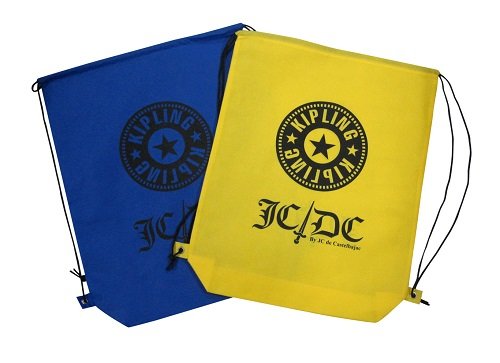To make non-woven bags, polypropylene or polyester polymers are spun into long fluffy threads using a combination of heat and air.

The threads are pressed together between hot rollers to create fabric.
Different pieces are then cut out of the fabric and sewn or attached to each other to create the bag itself.
- First of all, the non-woven bag can be washed, but it cannot be washed with a washing machine or rubbed vigorously. You can only rub it gently with your hands a few times, and then rinse it off.
- Soaking method. Soak the non-woven eco-friendly bag with cold water or warm washing powder for ten to twenty minutes. The time should not be too long, because the non-woven fabric material will be easily decomposed by water for a long time. Please do not use bleached or fluorescent detergent to prevent The non-woven shopping bag fades.
- When cleaning, it is recommended to gently wash by hand for the best effect. Do not use a brush. The non-woven bag will be easy to fluff, so the non-woven shopping bag will be difficult to see.
- If you want to clean quickly, it is recommended that you choose a soft brush, first gently rub it with your hands, and then use the soft brush to brush the whole thing. It must be light because the non-woven fabric is easy to break.
- After cleaning, level the non-woven shopping bag first. It is best to dry or blow-dry quickly. Keep the temperature low during drying and blow-drying, or remove excess water and level it in a cool and ventilated place. Dry in the shade.
- Consumers need to be reminded that when they buy non-woven shopping bags, it is best to choose those with a larger thickness. Although you will start to spend a little more money, you will It becomes a little easier.
Are Non-Woven Bags Eco-Friendly?
Although non-woven bags are eco-friendly in the sense that they can be reused over and over again, they are not entirely eco-friendly due to what they are made of.
Both polypropylene and polyester are forms of plastic that are created as a result of refining crude oil.
To make polypropylene and polyester, crude oil has to be refined with different chemicals and heavy manufacturing processes in order to create plastic polymers and give them certain characteristics.
There is the potential for pollution throughout the process of making plastic, including during the collection of the crude oil and the refinement of it.
Pollution could come in the form of an oil spill as well as air pollution through greenhouse gas emissions and soil and water pollution as a result of chemicals being leached or not being disposed of properly.
The process of turning the polypropylene and polyester polymers into bags isn’t as bad for the environment as the process of making the polymers in the first place.
Mostly mechanical processes are used, although the amount of energy used is still high in order to operate the machinery.
Most of the energy used comes from burning fossil fuels, which isn’t sustainable and has the potential to produce greenhouse gas emissions as well.
However, as long as you reuse non-woven bags as much as possible – especially for grocery shopping – you can still be eco-friendly since you won’t be using as many single-use plastic bags.



